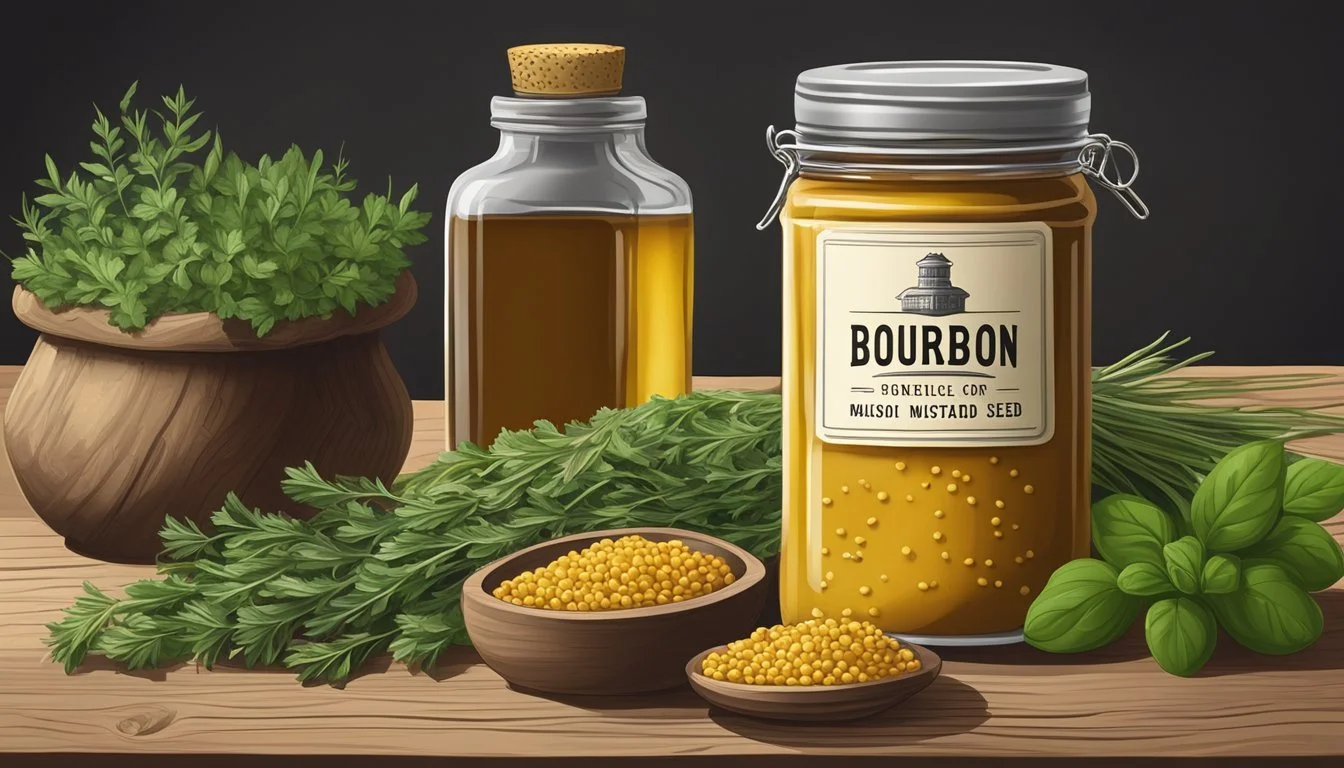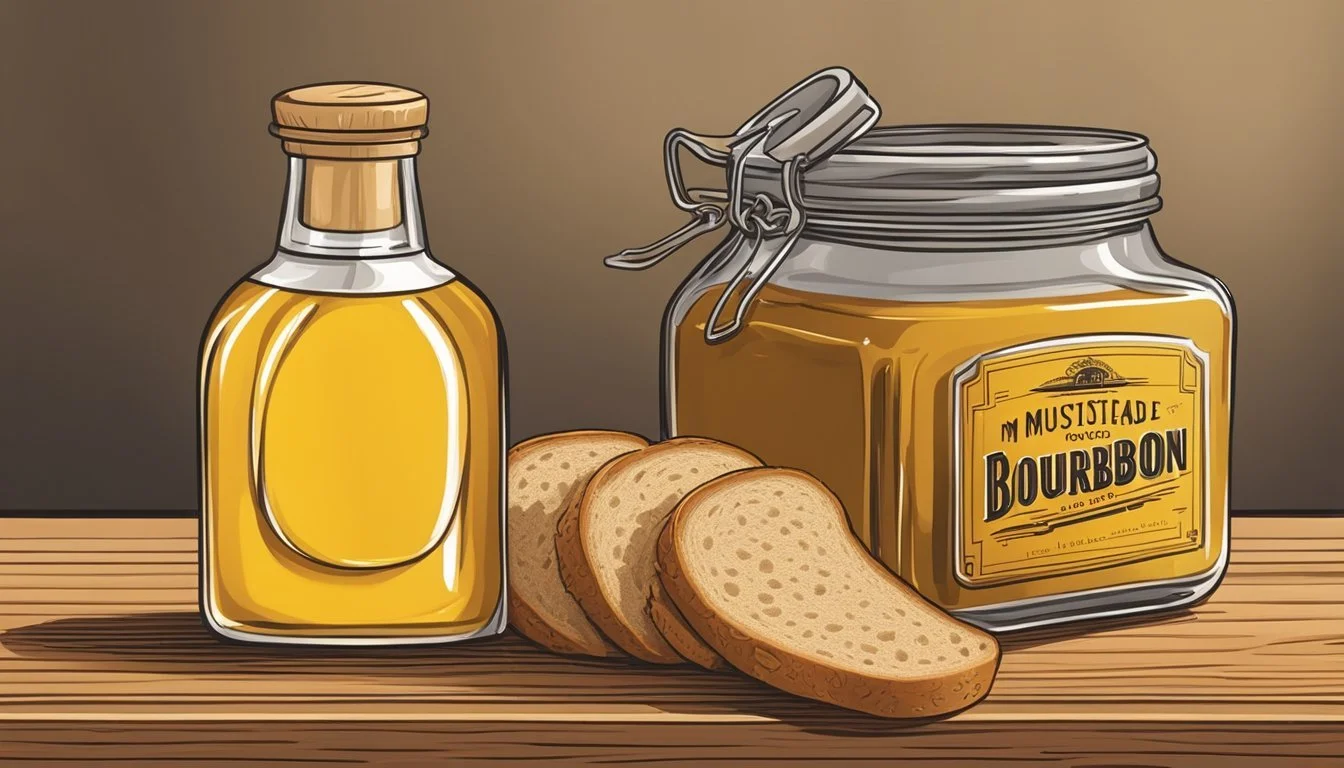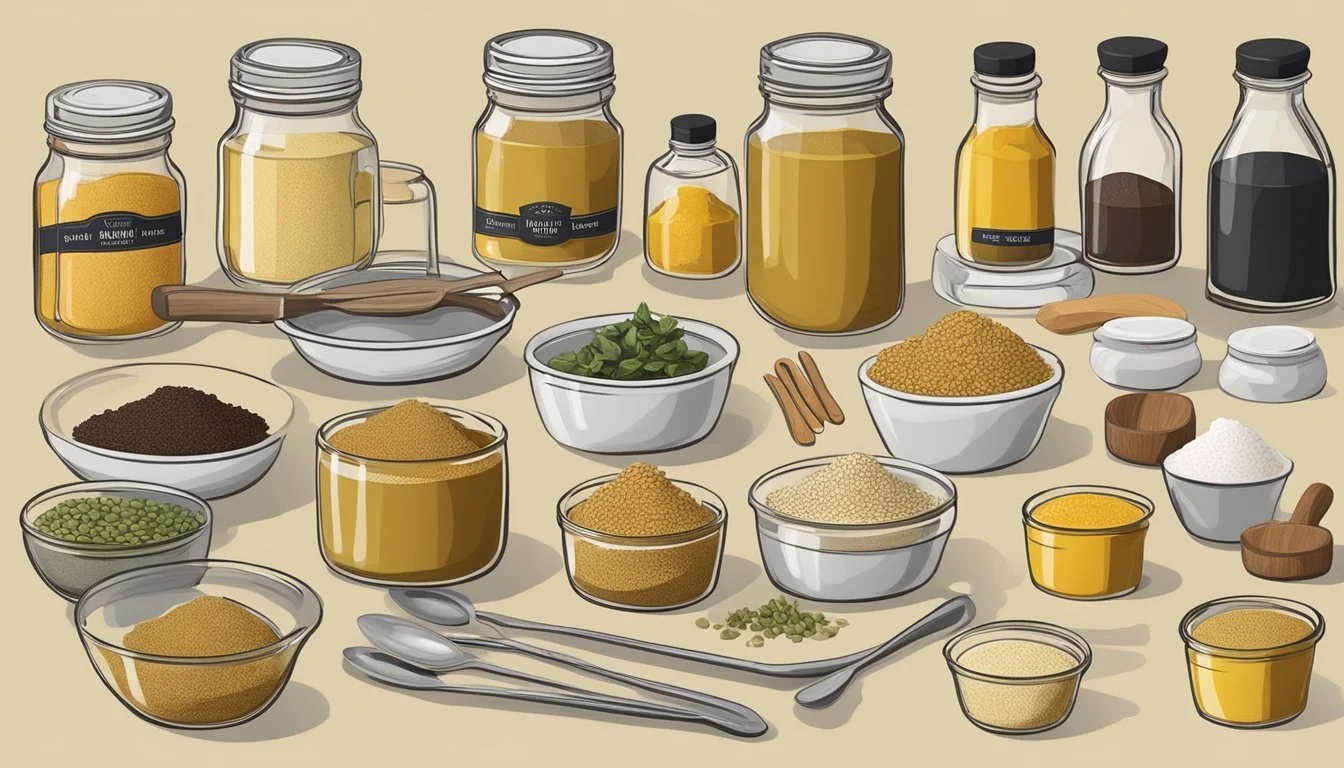Bourbon Mustard Substitutes
Top Alternatives for Your Recipes
Bourbon mustard is a condiment that enjoys a unique position in the culinary world, thanks to its rich, complex flavor profile. It combines the deep, smoky notes of bourbon with the sharp, tangy taste of mustard, making it a versatile addition to a host of recipes. Whether used as a glaze for meats, a punchy addition to dressings, or as a stand-alone dip, its distinct flavor characterizes many Southern-style dishes.
Finding a suitable substitute for bourbon mustard can be necessary for those avoiding alcohol, unable to find this specific product, or simply looking for a different flavor profile with a similar impact. Substitutes should offer both the warmth that bourbon imparts and the pungent kick of mustard. There are several options available that can mimic the depth and boldness of bourbon mustard using various combinations of ingredients commonly found in kitchens.
When selecting a substitute for bourbon mustard, the key is to balance the sweetness and the bite to achieve a harmony reminiscent of the original condiment. Alternatives may include using a combination of dijon mustard with a non-alcoholic liquid to simulate the smoothness of bourbon, or blending other types of whiskey or spirits with standard mustard varieties. These substitutes ensure that the essence of bourbon mustard can still be captured even when the original is not available.
Understanding Bourbon and Its Flavor Profile
This section examines bourbon's defining characteristics and the intricate factors that shape its complex flavor profile.
The Basics of Bourbon
Bourbon is a type of American whiskey that is distilled from a grain mixture, with at least 51% of it being corn. This corn content imparts a noticeable sweetness to the liquor. Bourbon is aged in new, charred oak barrels, which contribute to its distinct flavor.
Alcohol: Bourbon contains varying levels of alcohol, typically around 40-50% by volume.
Oak Barrels: The aging in charred oak barrels adds notes of vanilla, caramel, and wood to the bourbon.
Components Influencing Bourbon's Flavors
The flavor of bourbon is influenced by several components:
Aging Process: The time bourbon spends in oak barrels influences its flavors; longer aging can intensify the sweet and smoky characteristics.
Distillation Techniques: Different distillation methods can either mellow or enrich the bourbon's flavors, including its vanilla notes and nutty flavor.
By understanding these elements, one gains a greater appreciation of bourbon's robust and varied flavor profile that makes it a beloved spirit for many.
Culinary Uses of Bourbon
Bourbon is celebrated for its versatility in the kitchen, whether it's imbuing meats with richness or adding complexity to sweet confections. The robust flavors of bourbon, which include hints of vanilla, caramel, and oak, make it a dynamic ingredient in various recipes.
Meat Marinades and Sauces
In the realm of savory dishes, bourbon is often utilized to create deeply flavored marinades and sauces that complement the natural taste of meats.
Marinades: Chefs often incorporate bourbon into marinades to tenderize and flavor meats such as pork, chicken, and beef. Its high alcohol content helps to break down tough fibers in the meat, while its sweetness balances the savory notes.
Example Recipe: A bourbon marinade for pork chops might include bourbon, soy sauce, garlic, and brown sugar for a perfect mix of sweet and savory.
Sauces: It adds a complex and smoky undertone to barbecue sauces and glazes that pair perfectly with grilled or roasted meats.
Example Sauce: A classic bourbon barbecue sauce can transform ribs or chicken wings into a dish with a distinctive, smoky sweetness.
Desserts and Baking
Bourbon's role in sweet applications cannot be overstated, especially when it comes to classic American desserts and innovative baking recipes.
Cakes and Pecan Pie: Utilized in cakes and the iconic pecan pie, bourbon infuses these desserts with its unique flavors. The alcohol mostly evaporates during the cooking process, leaving behind a rich, nuanced taste.
Example Dessert: Pecan pie gains depth and character with a splash of bourbon mixed into the filling.
Bourbon Vanilla Extract: In baking, bourbon can be used to make bourbon vanilla extract, which imparts a delightful fragrance and taste to an array of baked goods.
Example Usage: This homemade extract can be used to enhance the flavor profile of cookies, pastries, and frostings.
In summary, bourbon's sweet, smoky profile makes it a favored ingredient in both savory and sweet culinary applications, enriching recipes with its full-bodied taste.
Alcoholic Bourbon Substitutes
When seeking a suitable alcoholic alternative to bourbon in mustard recipes, one should consider other whiskies for their similar flavor profiles. Brandy and cognac can also provide a comparable warmth and richness, while employing rums and other spirits introduces distinctive tastes that complement the mustard's pungency.
Substituting with Other Whiskies
Whisky varieties share a close relationship with bourbon in terms of taste and composition. For a direct substitute, rye whiskey offers a spicier note, whereas Scotch whisky, particularly the sweeter, less smoky options, can mimic bourbon's complexity. If the recipe calls for bourbon's sweetness, American whiskey could also be a viable substitute, albeit with a lighter flavor.
Using Brandy and Cognac
Brandy stands out as a bourbon substitute due to its fruit-based origins which impart a different kind of sweetness. To stay true to bourbon's depth, consider using Cognac, a type of brandy with a robust flavor profile that includes notes of caramel and vanilla, akin to those found in many bourbons. Their smoothness and richness can elevate the mustard sauce while maintaining the desired intensity.
Employing Rum and Other Spirits
Rum can be a surprising yet effective bourbon alternative, providing a distinctive molasses-based sweetness and spice that blends well with mustard's tanginess. One should opt for dark or aged rums to better emulate bourbon's nuanced flavor. Other spirits might also be considered if they offer complementary tasting notes, but their use should be judicious to ensure balance within the condiment's flavors.
Non-Alcoholic Bourbon Alternatives
When seeking a non-alcoholic substitute for bourbon in mustard, it primarily involves matching the profile of smokiness and sweetness typically provided by bourbon. This section encompasses a range of options using vinegars, juices, extracts, syrups, and non-alcoholic spirits to replicate those flavors in cooking.
Using Vinegars and Juices
Non-alcoholic alternatives that can mimic the tangy and sweet elements of bourbon include various vinegars and fruit juices. Apple cider vinegar, for example, provides a fruity tang that works well in mustard sauces. Combining it with peach nectar can balance its acidity and introduce additional sweetness and fruitiness, akin to the nuanced flavors of bourbon.
Substitute Ratios:
Apple Cider Vinegar: Use 1 tablespoon per tablespoon of bourbon.
Peach Nectar: Add 1 tablespoon per tablespoon of bourbon, in combination with the vinegar.
Extracts and Syrups
For those looking to capture the essence of bourbon's sweetness and depth, employing extracts and syrups is a beneficial approach. Vanilla extract offers a non-alcoholic option that brings a warm, rich flavor to recipes. Using almond extract in very small amounts can also introduce some of the nuttiness bourbon is known for.
Additionally, molasses can be used to provide the full-bodied sweetness associated with bourbon.
Suggested Additions:
Vanilla Extract: A few drops can be enough.
Almond Extract: Use sparingly, a drop or two should suffice.
Molasses: Adjust to taste, starting with a teaspoon for a robust sweetness.
Leveraging Teas and Non-Alcoholic Spirits
Certain teas have smokey qualities that can emulate the complexities of bourbon. Smoked teas, such as Lapsang Souchong, steeped strongly and used in moderation, offer a unique smokiness to dishes without the alcohol content.
There are also specific non-alcoholic spirits designed to replicate the flavor profiles of bourbon. These typically blend natural botanicals to achieve a flavor that resembles traditional bourbon and can be a direct one-to-one substitute for mustard recipes.
Effective Choices:
Smoked Black Tea (like Lapsang Souchong): Brew strong and substitute in small quantities.
Non-Alcoholic Bourbons: Use equivalent amounts as directed by the mustard recipe.
Specialized Substitutes for Unique Recipes
When seeking the perfect bourbon mustard substitute for distinct dishes, it's crucial to consider the profile of the original ingredient. Bourbon imparts a sweet, oaky note with a slight hint of vanilla to recipes, which some substitutes can mimic quite well.
Sweet and Dessert Dishes
For desserts and sweet applications, a unison of black coffee, brown sugar, and molasses can replicate the complex notes of bourbon. Each element contributes depth: coffee provides a roasted bitterness, brown sugar adds richness, and molasses brings a robust sweetness. Here's a quick mix ratio to use:
1 part black coffee
1 part brown sugar
1 part molasses
Mix the ingredients in equal parts and use them to replace bourbon in recipes like chocolate chestnut torte with chocolate cognac mousse or dessert sauces.
Savory Applications
In savory dishes such as barbecue sauce or meat marinades, alternate liquors like Cognac or Scotch offer a similar alcoholic complexity with additional unique flavors. Here's a succinct guide:
Cognac: With its floral and spicy notes, Cognac can bring out the subtleties in a recipe such as cognac shrimps.
Scotch: The Scottish liquor imparts a smoky flavor, making it a suitable substitution for dishes like ribs where a deep, rich essence is desired.
The choice of substitute impacts not only the taste but the authenticity of the dish, so one should select based on the desired outcome, whether one is aiming for fruity undertones or a more robust, spirited essence.
Crafting Your Own Bourbon Substitute
When substituting for bourbon in recipes, the goal is to mimic the spirit's complex flavor profile—combining sweetness, woody undertones, and a hint of vanilla and spice. Crafting a substitute requires careful blending to achieve a balance that resembles bourbon's distinctive taste, whether employing alcoholic or non-alcoholic ingredients.
DIY Alcoholic Blends
For a homemade alcoholic bourbon substitute, one can consider blending other spirits that share similar flavor profiles. They must undertake the task with precision, ensuring not to overpower the palette of the intended dish.
Cognac or Brandy: These are distilled from grapes and can provide a rich, fruity flavor with notes of vanilla and oak that mimic bourbon's complexity. To assemble a blend, they should combine:
1 part Cognac or Brandy
A splash of vanilla extract
2 teaspoons of brown sugar
Scotch Whiskey: While Scotch has a distinct smoky flavor, it can serve as the base for a bourbon substitute if balanced with sweeter elements. They should mix:
1 part Scotch
1 teaspoon honey
A few drops of orange juice
Both mixtures should be adjusted to taste and used in the same quantity as bourbon called for in the recipe—always putting careful consideration into the cooking process not to burn off the nuanced flavors.
Creating Non-Alcoholic Mixes
Non-alcoholic substitutes are valuable for those who abstain from alcohol yet still seek to achieve a bourbon-like essence in their cooking. When they craft a non-alcoholic blend, they focus on replicating the sweet, caramel-like, and slightly smoky notes of bourbon.
Juice and Spice Mix: A combination of fruit juice and common pantry spices can emulate bourbon's sweetness and depth. They should stir together:
1 cup apple juice or apple cider
1 tablespoon of brown sugar
A sprinkle of ground cinnamon
A few drops of vanilla extract
Tea-Based Blend: By steeping tea at a high temperature, they can extract flavors that parallel the woody notes of bourbon. A tea-based concoction might include:
1 cup of strong brewed black tea
1 tablespoon of honey or molasses (to add sweetness)
1/2 teaspoon of vanilla extract
Adjustments can be made to the quantities of honey, sugar, and spices to fine-tune the flavor, depending on the specific requirements of the recipe. This mix assumes the role of bourbon in both sweet and savory dishes, bringing the desired complexity without any alcohol content.
Food Pairing with Bourbon Substitutes
When cooking with bourbon substitutes, the goal is to complement the original bourbon flavor profile while pairing with a variety of foods. Substitutes like dark beers and non-alcoholic options offer distinct tastes that can enhance different dishes.
Red Meat and Game
For red meats and game, the full-bodied richness of dark beers such as stouts, Guinness, or porters can stand in for bourbon, bringing a similar depth to sauces and marinades. For example:
Roasted Pork: A stout-based glaze can provide roasted pork with a complex, caramelized flavor that echoes the notes typically found in bourbon.
Beef: Porters, with their bold malt and chocolate notes, can create a robust alternative in a reduction sauce for a beef dish, offering a harmonious balance to the savoriness of the meat.
Seafood and Lighter Fare
When pairing with seafood or lighter dishes, the spicy effervescence of ginger beer offers a bright substitute for bourbon, lending a zestiness without overpowering delicate flavors.
Grilled Fish: Seafood dishes, particularly those grilled or barbecued, benefit from a marinade with ginger beer, adding a subtle spice that complements the natural flavors of the fish.
Salads: In salad dressings, non-alcoholic options such as apple juice can introduce a sweet and tangy quality that pairs well with hearty greens and adds a bourbon-like fruitiness.
In-Depth Look at Alcoholic and Non-Alcoholic Substitutes
When considering substitutes for bourbon mustard, it is essential to recognize differences in flavor and health implications between alcoholic and non-alcoholic options.
Alcoholic Versus Non-Alcoholic Options
Alcoholic substitutes for bourbon generally include other spirits that share a similar flavor profile. Bourbon, characterized by notes of caramel, vanilla, and oak, can be substituted in cooking with other types of whiskey, such as rye or wheat whiskey, due to their comparable tastes. Rum, especially dark or spiced varieties, can also be used as it offers a sweetness that echoes the rich undertones of bourbon.
Non-alcoholic substitutes may include liquids that can mimic the essence of bourbon without the alcohol content. Options such as non-alcoholic vanilla extract provide a vanilla note found in bourbon. Mixtures like a blend of 2/3 peach-flavored nectar and 1/3 cider vinegar can replicate the fruity and acidic components. Additionally, non-alcoholic distilled wine and non-alcoholic beers might be viable alternatives due to their complex flavor profiles.
Health Considerations
The choice between alcoholic and non-alcoholic substitutes may be influenced by dietary restrictions, religious beliefs, or health considerations. Alcohol-free alternatives omit the intoxicating effects of alcohol, offering a safer choice for those who abstain from alcohol consumption.
When selecting a substitute, it is crucial to consider the main ingredients used in the product in terms of their health impact. For example, non-alcoholic alternatives may still contain sugars or other additives to achieve a flavor similar to bourbon. Conversely, alcoholic options like beer or wine can contribute additional calories and may contain gluten, which is an important consideration for individuals with gluten sensitivity or celiac disease.
Conclusion
In the realm of culinary arts, versatility is key, and when it comes to finding substitutes for bourbon, especially in the creation of bourbon mustard, there are several suitable alternatives. It is fundamental to match flavors, considering elements such as sweetness, smokiness, and the unique taste profile bourbon imparts to dishes.
Apple Cider Vinegar: Offers a touch of sweetness and can introduce a slight tartness, enhancing the mustard's complexity.
Vanilla Extract: Maps onto the vanilla notes often discovered in bourbon, like the Four Roses Single Barrel, although it necessitates judicious use due to its concentrated nature.
Black Tea: The robustness of strong brewed black tea can mimic the depth traditional whiskies contribute.
Molasses & Brown Sugar Combination: To emulate bourbon's sweetness and richness, this duo can act as a non-alcoholic alternative, valuable in moderating the pungency of mustard.
Each substitute must be chosen with thought to its end-use. Whether the mustard is meant for marinades, dressings, or as a condiment, taste adjustments are crucial. Additionally, enthusiasts of fermentation and distillation processes may appreciate the use of Scotch, which shares a similar crafting heritage yet carries a distinctive flavor profile.
The expertise in substitutions lies in one's ability to balance the ingredients to achieve a harmonious end product. Whether it's a non-alcoholic replica or a close spirit relative, the ideal replacement for bourbon in mustard seamlessly dovetails with the original's sensory attributes, allowing the crafted mustard to stand confidently on its culinary merits.











